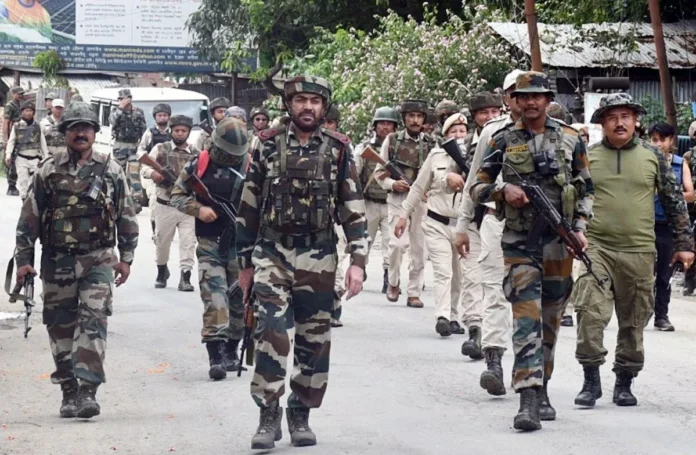In a bold yet thwarted operation, a Manipur Police team attempting to clear illegal opium poppy cultivation in the remote hills of Kangpokpi district was forced to retreat after being confronted by 80-90 armed miscreants. The incident, outlined in a First Information Report (FIR), underscores the challenges faced by authorities in tackling illicit activities in a region riddled with insurgent influence and ethnic tensions.
Police Outnumbered and Under Armed in Dangerous Mission
The 25-member joint team comprised police personnel, volunteers from the Liangmai Naga tribe, and support staff, including five drivers. Equipped with only three assault rifles, the team embarked on a physically taxing mission to destroy poppy farms using basic farm tools. The operation began on November 18 from G Saparmeina police station, located 35 km north of Imphal. After trekking three hours to reach the Makhan hill range, the team encountered a heavily armed group of miscreants.
The attackers, wielding guns, daggers, and wooden clubs, blocked the team’s path and issued death threats should the operation continue. Outnumbered and isolated, with reinforcements too far away, the team had no choice but to retreat to ensure their safety.

Kangpokpi: A Hotbed of Conflict and Illegal Cultivation
Kangpokpi district has become a focal point for illegal opium cultivation and insurgent activities. The region is often included in unofficial maps circulated by the Kuki tribes, who demand a separate administration carved out of Manipur. The district is also a stronghold of the Kuki National Front (KNF), led by ST Thangboi Kipgen. The KNF is one of over two dozen Kuki-Zo militant groups that signed the controversial Suspension of Operations (SoO) agreement with the government, which many local stakeholders, including the Manipur government, have called to be terminated.
Meitei community groups have accused Kuki insurgents of being complicit in cultivating and profiting from illegal opium farming in areas under their control. Civil society organizations and local authorities are urging the government to take swift action against encroachment and illicit cultivation.
Government and Local Authorities Respond
The Makhan village authority has issued an ultimatum to the government, demanding the removal of illegal poppy plantations within four days. Failure to act, they warned, could lead to a “repulsive and abominable” response from the local population. Meanwhile, Manipur Chief Minister N Biren Singh confirmed the presence of illegal opium farms in five villages within Kangpokpi district. He assured that these plantations would be destroyed soon, citing that the delay stemmed from the security forces being occupied with managing other sensitive areas in the ethnically volatile state.
Despite these assurances, the retreat of the joint police team highlights the complexities of enforcing law and order in areas dominated by armed groups and illegal operations.

A Broader Anti-Poppy Drive in the Works
Unconfirmed reports suggest that central forces are planning a significant operation to dismantle newly discovered poppy farms in Manipur. Sources indicate that security personnel will retaliate against armed resistance to the anti-poppy cultivation drive. The operation is expected to involve a coordinated effort from state and central forces to address the growing menace.
The Kangpokpi police chief had earlier issued directives to officers at Kangpokpi and G Saparmeina police stations to clear illegal opium farms in the Makhan hill range. However, the lack of adequate security for such operations remains a critical issue, as highlighted by the November 18 incident.
Ongoing Challenges and the Need for Strategic Action
The fight against illegal opium cultivation in Manipur is fraught with logistical, security, and political challenges. The region’s rugged terrain, coupled with the presence of armed groups, makes it difficult to conduct operations effectively. The limited resources and manpower allocated to these missions further exacerbate the problem.
While digital mapping and intelligence-sharing have improved the identification of illicit farms, the government must address the safety and operational needs of enforcement teams. A comprehensive approach involving better coordination, enhanced security measures, and community engagement is crucial to tackling this issue.
The retreat of the Manipur Police team underscores the urgency of deploying adequate resources and reinforcements to combat illegal opium cultivation effectively. As the state grapples with this growing challenge, swift and decisive action will be critical to restoring law and order and curbing the proliferation of poppy farming in the region.

